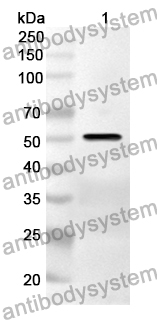Catalog No.
PHJ29601
Description
PDCD6IP is an adapter for a subset of ESCRT-III proteins, such as CHMP4, to function at distinct membranes. PDCD6IP is mandatory for completion of cytokinesis. PDCD6IP takes part in HIV-1 virus budding. PDCD6IP replaces TSG101 in its function of supporting HIV-1 release.The protein PDCD6IP is enriched in exosomes and shows higher abundance in both PCa-derived exosome samples . Based on the MS analyses, FASN is significantly higher in the PC346C exosomes.
Species reactivity
Human, Mouse, Rat
Host species
Rabbit
Isotype
IgG
Clonality
Polyclonal
Immunogen
E. coli - derived recombinant Human PDCD6IP (Glu174-Ala383).
Tested applications
ELISA: 1:4000-1:8000, IHC: 1:50-1:100, WB: 1:1000-1:4000
Target
ALG-2-interacting protein 1,ALG-2-interacting protein X,Hp95,AIP1,ALIX,KIAA1375,PDCD6IP,Programmed cell death 6-interacting protein,PDCD6-interacting protein
Purification
Purified by antigen affinity column.
Accession
Q8WUM4
Applications
ELISA, IHC, WB
Form
Liquid
Storage buffer
0.01M PBS, pH 7.4, 50% Glycerol, 0.05% Proclin 300.
Stability and Storage
Use a manual defrost freezer and avoid repeated freeze thaw cycles. Store at 2 to 8°C for frequent use. Store at -20 to -80°C for twelve months from the date of receipt.
A comprehensive analysis of different gene classes in pancreatic cancer: SIGLEC15 may be a promising immunotherapeutic target., PMID:34515878
Proteomic profile of melanoma cell-derived small extracellular vesicles in patients' plasma: a potential correlate of melanoma progression., PMID:33613873
Descriptive analysis of Fibulin-3 and the extracellular vesicle marker, Alix, in drusen from a small cohort of postmortem human eyes., PMID:33387484
Mucosal microbiota and gene expression are associated with long-term remission after discontinuation of adalimumab in ulcerative colitis., PMID:33154436
Intra-endosomal trafficking mediated by lysobisphosphatidic acid contributes to intracellular release of phosphorothioate-modified antisense oligonucleotides., PMID:28379543
Integrin signaling via FAK-Src controls cytokinetic abscission by decelerating PLK1 degradation and subsequent recruitment of CEP55 at the midbody., PMID:27127172
The 5XFAD Mouse Model of Alzheimer's Disease Exhibits an Age-Dependent Increase in Anti-Ceramide IgG and Exogenous Administration of Ceramide Further Increases Anti-Ceramide Titers and Amyloid Plaque Burden., PMID:25720409
Alix serves as an adaptor that allows human parainfluenza virus type 1 to interact with the host cell ESCRT system., PMID:23527201
ALIX binds a YPX(3)L motif of the GPCR PAR1 and mediates ubiquitin-independent ESCRT-III/MVB sorting., PMID:22547407
Association of Alix with late endosomal lysobisphosphatidic acid is important for dengue virus infection in human endothelial cells., PMID:20669987
The nucleocapsid region of HIV-1 Gag cooperates with the PTAP and LYPXnL late domains to recruit the cellular machinery necessary for viral budding., PMID:19282983
The CHMP4b- and Src-docking sites in the Bro1 domain are autoinhibited in the native state of Alix., PMID:19016654
Extracellular Alix regulates integrin-mediated cell adhesions and extracellular matrix assembly., PMID:18636094
The HIV-1 p6/EIAV p9 docking site in Alix is autoinhibited as revealed by a conformation-sensitive anti-Alix monoclonal antibody., PMID:18476810
Alternative polyadenylation produces two major transcripts of Alix., PMID:17673164
Involvement of host cellular multivesicular body functions in hepatitis B virus budding., PMID:17551004
Alix (AIP1) is a vasopressin receptor (V2R)-interacting protein that increases lysosomal degradation of the V2R., PMID:17287200
HD-PTP and Alix share some membrane-traffic related proteins that interact with their Bro1 domains or proline-rich regions., PMID:17174262
Involvement of the conserved adaptor protein Alix in actin cytoskeleton assembly., PMID:16966331
Identification and cloning of xp95, a putative signal transduction protein in Xenopus oocytes., PMID:10026166

